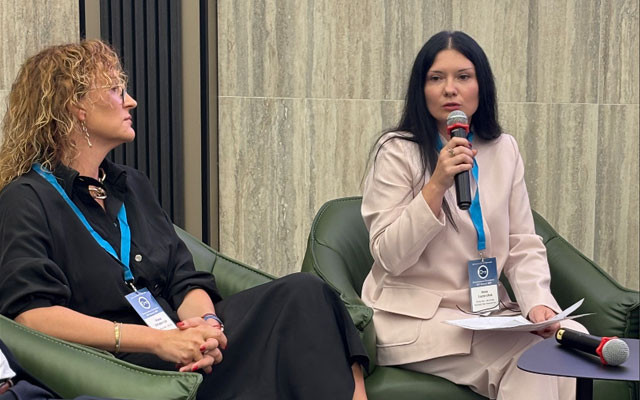
The challenges facing advocacy in times of war were outlined at a conference in Chisinau

Thanks to the current law, Ukrainian advocacy has constitutionally enshrined independence and special status, reinforced by the 2016 judicial reform. However, wartime has presented the profession with new challenges.
Hanna Lazarchuk, a member of the BCU, spoke about the most common violations of the rights of Ukrainian advocates during her speech at the International Conference of the Bar Association of the Republic of Moldova, held on September 12 in Chisinau.
One of the most sensitive issues during wartime has been the identification of advocates with their clients, especially in cases involving war crimes. Society and the media often try to portray defense advocates as sharing the views or actions of their clients, which is contrary to the essence of the profession. The UNBA Committee on information policy has tried to explain the inadmissibility of such actions, in particular through a special guide for journalists. However, the media emphasized that, despite the legislative ban, there is no liability for violations. The gap is to be closed by a law passed by the Verkhovna Rada on July 16 and sent to the President for signature. It introduces administrative liability for identifying an advocate with a client. Protocols will be drawn up by regional bar councils, and decisions will be made by courts. According to H. Lazarchuk, this mechanism complies with the provisions of the Council of Europe Convention on the protection of the profession of advocate, prepared with the participation of Ukraine and already signed by 18 states.
An equally acute problem is the restriction of advocates' access to clients in territorial recruitment centers and the risk of their illegal mobilization while providing legal assistance. There have been cases where advocates were handed a summons immediately upon arrival at the TCC, required to undergo a military medical examination, and mobilized, effectively depriving them of the opportunity to perform their professional duties. Defense attorneys are often denied access to the TCC premises on the grounds of «security restrictions», or are handed summonses during court hearings and client interrogations. The UNBA has attempted to establish communication with the competent authorities in order to guarantee the right to legal assistance during the detention and delivery of persons to the TCC. In a number of regions, with the assistance of bar associations, it was possible to set up special rooms for confidential meetings. At the same time, citizens in the TCC are often persuaded that they do not need an advocate, which leads to errors in documents and subsequent mobilization.
The participants of the event also drew attention to cases where individuals posed as «military advocates» and offered citizens forceful actions to avoid mobilization. Such actions not only discredit advocacy, but also actually hinder the work of the Armed Forces and create a negative attitude towards the profession in society, emphasized Hanna Lazarchuk.
The UNBA records all violations and responds to them within the limits of its authority. One of the key tasks of the organization is to support Ukraine's ratification of the Council of Europe Convention on the protection of the profession of advocate.
© 2025 Unba.org.ua Всі права захищені
"Національна Асоціація Адвокатів України". Передрук та інше використання матеріалів, що розміщені на даному веб-сайті дозволяється за умови посилання на джерело. Інтернет-видання та засоби масової інформації можуть використовувати матеріали сайту, розміщувати відео з офіційного веб-сайту Національної Асоціації Адвокатів України на власних веб-сторінках, за умови гіперпосилання на офіційний веб-сайт Національної Асоціації Адвокатів України. Заборонено передрук та використання матеріалів, у яких міститься посилання на інші інтернет-видання та засоби масової інформації. Матеріали позначені міткою "Реклама", публікуються на правах реклами.